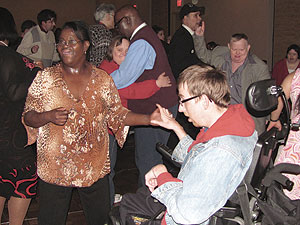
Individuals who hit the dance floor at the Walnut Street Center's annual holiday party included (left to right): Gina Olivier, Lynn Potter, Randy Dottin, Stephen Michael Dewar, and Ray Hardy. – Photo by Elizabeth Sheeran
Developmentally disabled adults find a place to thrive in Somerville
By Elizabeth Sheeran
At midday last Thursday, the ballroom of the Holiday Inn on Washington Street was filled to capacity with partygoers, celebrating the season.
Tim Adkins had high praise for the meal, the deejay, the room, and everything else about the party. Bob Spezzafaro said he enjoyed dancing with his girlfriend Denise Poor, who was showing off a ring Spezzafaro had given her as an early Christmas gift. Moving about the room in a red sweater topped with a necklace made of Christmas ornaments, Lynn Potter said the best thing about the party was meeting people. And the ice cream.
“It’s kind of a big family party,” said Adkins.
Family is a good way to describe the nearly two hundred people gathered for their annual holiday party last week. Because Adkins, Spezzafaro, Poor and Potter share more in common than their love of good food, dancing, and Christmas. They’re also all part of the community of the Walnut Street Center, a Somerville non-profit that provides a support system to developmentally-disabled adults and their families.
The Center was first established four decades ago by Somerville parents of children with Down syndrome and other developmental disabilities, who were unhappy with the options then available to their children, which often meant a lifetime in state institutions, separated from families and the community.
“There was nothing available for these individuals in the community back then,” said Walnut Street Board President John Mahoney, whose daughter Janice has participated in the Center’s programs for over 30 years. “Some funding came available and we starting doing some things. We’re the best-kept secret in the city.”
The Walnut Street Center, so-named for its original location, was one of the first organizations of its kind in the state, and became a model for helping developmentally disabled adults live full, active lives, integrated into the fabric of their families and communities, said Executive Director Joseph Churchill.
“The people who founded this program were pioneers,” said Churchill. “They were responsible for transforming the service industry for people with disabilities.”
More than half of the more than 200 developmentally disabled adults who live in Somerville today are connected with Walnut Street’s programs, living in one of the Center’s 30-odd supervised residences, participating in day programs, or some combination of both.
On any given weekday, the Center’s building next to the Target store off Somerville Avenue is a beehive of activity. Walnut Street’s classrooms buzz with a mix of care and instruction tailored to individual needs, covering everything from basic life skills to vocational training.
Spezzafaro, Poor and Potter work on-site at the Center’s Walnut Street Industries, which pays them competitive wages to complete contract work, such as putting together mass mailings for private businesses. Participants in Walnut Street’s ACCESS program, including Adkins, come and go from classes where they learn important job skills, like how to use a cash register or deal with customers, to jobs elsewhere in the community.
Such paid work is a win-win all the way around, said Churchill. Employers get workers who are loyal, flexible and supervised. Individuals are less dependent on government support. And individual workers get the confidence and satisfaction that comes from a paycheck they worked to earn.
“They have more spark for life, because they have something fulfilling, something to look forward to,” said Herbert Ngera, who supervises ACCESS participants in work ranging from delivering meals to homebound seniors, to cleaning fish tanks, to catering weddings. “Life has so much more meaning when you have work to do.”
Churchill said developmentally disabled adults today are leading longer, healthier lives than just one generation ago, and a big reason is that they reap the benefits of being active, contributing members of the community just like anyone else.
“They have the same goals as you or I,” said Craig Fletcher, who oversees Walnut Street’s day programs.” A decent home. A family. Meaningful work.”
But while the ideal goal is to help more developmentally disabled adults live independently and work at a competitive-wage job in the community, Walnut Street’s mission is simply to help each individual continue to learn and grow. Every step forward is celebrated as a success, no matter how small it may seem.
“At the end of the day, what matters is that everyone is proud of themselves,” said Ron Keech, an instructor in Walnut Street’s center-based employment program.
The challenges are increasing. Recession-related budget cuts have all but eliminated a program that helped families of developmentally disabled adults who live at home with parents or siblings. And level funding makes it hard to find and keep qualified staff, in a program whose success depends on individualized attention.
But Walnut Street’s leaders are optimistic, particularly when they look back at how much progress has already been made.
One in four day program participants now works outside the Center, at places like the Museum of Science, or Tags Hardware near Porter Square, and Fletcher said that number will continue to rise, particularly since younger adults today are more likely to have attended public schools and have been actively involved in the community their whole lives.
And after four decades helping Somerville’s developmentally disabled adults and their families, The Walnut Street Center plans to continue to meet the needs of future generations.
“To see this environment, it’s a relief and a comfort,” said Keech, who is himself the parent of a developmentally disabled seven-year-old son. “As a parent, I want to know there’s a place that he can go where he can be safe, where he’s going to feel like he belongs, and where he can feel accomplished.”















Reader Comments